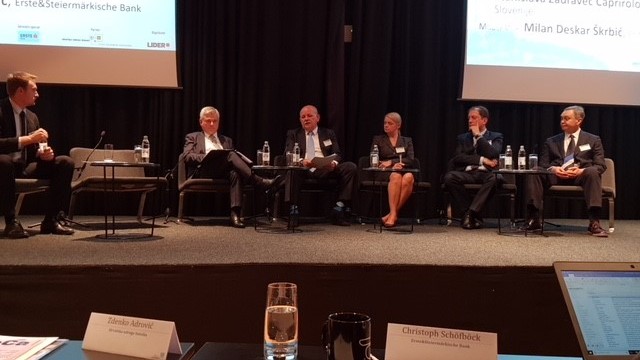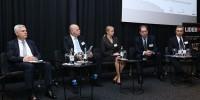The 6th Lider's meeting of the governora of the region, Rovinj 27.3.2018.
The second part of the 6th Lider's meeting of the governors of the region held in Rovinj was reserved for the financial industry, ie discussion of banks' efficiency in terms of reducing the net interest margins and other pressures on the business.
The topic of this lecture was given by economist analyst Velimir Šonje, who explained that the decline in margins can hardly be compensated by the increased in volume, which means that for the banking sector it remains only to increase efficiency. As he said, there are internal (technical) and external (wider efficiency)efficiency, paying attention to the first one by comparing the entire banking systems.
As he showed, the countries of the region according to three models of bank’s input and output analysis are mostly technically efficient, and Croatia retains relative efficiency even when compared with developed European banking systems. It follows that the room for increasing efficiency should be sought outside the banks themselves, within the regulatory environment, in the institutional framework, in the reforms and in the development of competition. One interesting finding of his analysis was the negative relation of the state's share of business and technical efficiency. In other words, as banks rely more on business with the state, the technical efficiency is lower. Consequently, banks in looking for their efficiency should also pay attention to this factor.
Regulatory tsunami
At the round table that followed, representatives of the banking sector in the region elaborated these ideas and gave their opinions about the near future for banks and their efficiency. At the question of Milan Deskar Škrbić's, the moderator, how to boost efficiency, President of Erste & Steiermarker's Bank Christoph Schoefboeck confirmed that banks are technically very efficient and that the net margin is falling, which can no longer be offset by higher revenues. The regulatory tsunami has further complicated the situation for banks and therefore banks have no choice but to be more efficient. Additionally, the director of the Croatian Association of Banks Zdenko Adrovic emphasized that in addition to increasing volume and cost-cutting, there are two other places to increase efficiency in Croatia: the coverage ratio (the ability of the bank to absorb potential losses of unanticipated loans) and high regulatory cost.
Increasing efficiency through deregulation
That entry into the euro area has brought pluses and minuses, said the director of the Slovenian Association of Banks, Stanislav Zadravec Caprirolo. For example, costs have increased due to increased regulation and fees (ESB, National Central Bank, Recovery Fund ...), but it has also increased robustness and created a security network for banks. He agreed with his colleagues that there is room for increasing efficiency through deregulation, especially when there is a high level of harmonization within the EU.
How much has the political instability influenced the banking sector in BiH and Macedonia, was explained by CEO of the Banking Association of BiH Berislav Kutle and deputy chairman of the Macedonian Banking Association Toni Stojanovski. BiH has the highest political instability, Kutle believes, which is why developing the banking sector is extremely difficult. Nevertheless, the banking sector is the most developed industry in BiH, he added, and profitability has never been higher. He warned that banks would have to cooperate with the financial technology sector instead of competing with them, as well as having to stop keep an eye on profitability only, which is just one of the efficiency benchmarks. Stojanovski was similarly thinking that political instability was very detrimental to the banks, but that, thanks to good fundamentals, they absorbed this shock.





